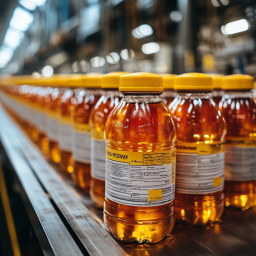
In today’s highly regulated food and beverage environment, juice bars and cold-pressed beverage businesses face unique legal challenges that can impact their ability to operate and expand.
We provide comprehensive legal support to help juice brands maintain compliance with FDA, CDPH, and local health regulations—so they can stay open, avoid enforcement actions, and focus on growth.
Why Juice Bars Face Increased Legal Scrutiny
Over the past few years, the FDA and California Department of Public Health (CDPH) have stepped up inspections of juice bars, ghost kitchens, and cold-pressed juice operators.
These businesses are often cited for violations related to unsafe raw juice handling, improper shelf-life claims, mislabeling, and lack of required food safety plans—especially HACCP plans for juice processing.
Without proper legal guidance, even a minor violation can escalate into:
- Warning letters
- Mandatory product recalls
- Temporary shutdowns
- Civil penalties
- Damage to brand reputation
That’s why having the right legal partner is critical—especially for operators expanding across California or nationally.
Key Areas Where Juris Law Group, P.C. Supports Juice Brands
Our firm provides tailored legal strategies to address the full range of regulatory risks affecting juice bars and cold-pressed beverage companies:
1. FDA Juice HACCP Plan Compliance
What is a Juice HACCP Plan?
Under FDA regulations, most juice manufacturers must implement a Hazard Analysis Critical Control Point (HACCP) plan to identify and control food safety risks.
We help juice businesses:
- Develop compliant HACCP plans
- Register facilities with the FDA
- Prepare for inspections and audits
- Respond to FDA Form 483 observations
Failure to maintain an approved HACCP plan can result in immediate enforcement action—including shutdowns.
2. CDPH Food Safety Inspections and Enforcement Defense
In California, CDPH plays a leading role in regulating food safety standards for juice bars.
We assist clients by:
- Preparing for CDPH inspections
- Responding to inspection reports and deficiency notices
- Representing businesses in administrative hearings
- Negotiating resolutions to avoid fines and closures
Our proactive support helps brands manage regulatory risks before they escalate.
3. Labeling Compliance for Juices and Smoothies
Juice labels must accurately disclose:
- Ingredients (in descending order)
- Nutrition facts panels
- Allergen warnings
- Raw juice risk disclosures (when applicable)
- Proper health claims (avoiding unsubstantiated disease prevention claims)
We provide label reviews and help companies navigate evolving FDA and CDPH standards, minimizing the risk of misbranding violations.
4. Raw Juice Risk Disclosures and Safe Handling Protocols
Can juice bars sell unpasteurized juice legally?
Yes—but with strict conditions.
Operators must provide required warning disclosures about pathogen risks and implement safe handling protocols. We help juice businesses:
- Draft compliant in-store warnings and disclaimers
- Train staff on safe juice preparation and service
- Manage risk associated with cold-pressed, high-pressure processed (HPP), or raw juice offerings
Proper documentation and procedures are critical to avoid liability.
5. Shelf-Life Claims and Pathogen Reduction Validation
Making shelf-life claims for raw or lightly processed juices without scientific validation can trigger enforcement.
We guide brands on:
- FDA-compliant shelf-life representations
- Documentation to substantiate any extended shelf-life claims
- Using HPP or other validated processes to support marketing efforts
Compliance with shelf-life rules not only protects your label claims but also your customer safety.
6. Enforcement Response: Cease-and-Desist Letters, 483 Observations, and More
If you receive a:
- Cease-and-desist letter from CDPH
- FDA 483 observation report
- Warning letter
Time is critical.
We act fast to develop response strategies, engage with regulators, and negotiate outcomes that protect your ability to continue operations.
Specialized Legal Support for Juice Franchises, Ghost Kitchens, and Multi-Unit Expansion
Whether you’re running a single location, a franchise, or scaling through ghost kitchen partnerships, we help operators structure contracts, navigate regulatory risks across jurisdictions, and avoid operational pitfalls that can arise when opening new locations.
Frequently Asked Questions About Juice Bar Compliance
Question 1: Does my juice bar need a HACCP plan?
Answer 1:
If you process or package juice for sale, FDA regulations require a HACCP plan that identifies potential hazards and outlines critical control measures. Failure to comply can lead to enforcement action.
Question 2: What disclosures are required for raw, unpasteurized juice?
Answer 2:
You must post visible consumer warnings about the health risks associated with consuming raw, unpasteurized juices. The warning must comply with FDA and CDPH formatting rules.
Question 3: How can I legally make health claims about my juice products?
Answer 3:
Claims such as “boosts immunity” must be supported by scientific evidence and comply with FDA regulations. Disease prevention or treatment claims are prohibited without approval.
Question 4: What happens if CDPH finds violations at my juice bar?
Answer 4:
Depending on the severity, you could face warning letters, administrative fines, mandatory corrections, or even temporary closure. Immediate legal counsel is crucial.
Question 5: Can I expand my juice bar nationally without adjusting compliance practices?
Answer 5:
No. Different states impose varying food safety and labeling requirements. It’s critical to customize your compliance plan for each jurisdiction.
Final Thoughts: Protect Your Juice Bar with Smart Legal Strategy
Operating a juice bar or cold-pressed beverage company offers exciting opportunities—but also real legal risks. With federal and state regulators increasing scrutiny, it’s more important than ever to have a legal team that understands the unique challenges of the juice industry.
At Juris Law Group, P.C., we don’t just respond to enforcement threats—we help you build proactive compliance strategies that keep your doors open, your labels accurate, and your brand growing. Whether you’re just starting or scaling across California and beyond, our team is ready to support your success with tailored, practical legal solutions.
Contact us today for a consultation on FDA, CDPH, and cold-pressed juice compliance.


